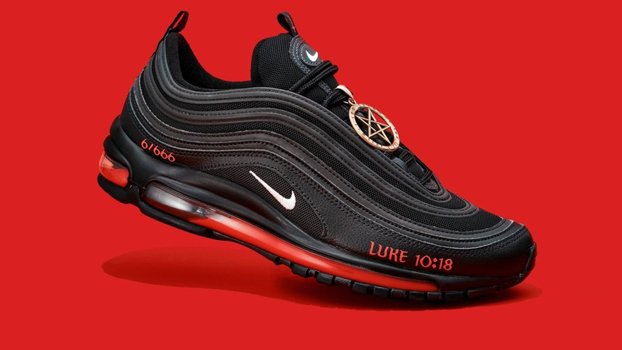Nike’s satan shoe lawsuit is a slam dunk

Stephen L. Carter
I expect Nike to have little trouble winning its lawsuit against MSCHF, maker of the Satan Shoe, a modified Nike Air Max 97. The footwear was developed in collaboration with the, um, entertainer Lil Nas X, who in his most recent video, as the New York Time deadpans, “gyrates on Satan’s lap.” The entire run of exactly 666 pairs (of course) sold out in less than a minute — at a price point over over $1,000 each.
In addition to the familiar Nike swoosh, the repurposed sneaker is emblazoned with a pentagram, a reference to Luke 10:18, and, visible in the sneaker’s air bubble, a red fluid that contains, among other ingredients, human blood. All of this has led to an internet fury directed not against MSCHF, a small company long known for its “viral stunts,” but against Nike. The Oregon sportswear behemoth, which neither endorsed nor licensed the shoe, is being threatened with boycotts. This confusion about who’s to blame for the offensive imagery will help Nike make its case for trademark infringement.
Nike will also be aided by something else: the long line of court decisions holding that an accusation that someone is associated with Satan constitutes actionable defamation. Back in the 17th century, a British judge wondered whether the court was required to find that the devil actually exists before ruling on such a claim. Nobody takes that view anymore.
Consider Procter & Gamble, which has long been dogged by bizarre rumors that its moon-and-stars logo is a Satanic symbol. In 2007, after more than a decade of litigation, the company won a $19 million verdict against four Amway distributors accused of spreading versions of that false tale.
The cases go on and on. Back in 1948, the California Supreme Court held that a defamation suit could proceed on the basis of a church’s public statement that two members had been dismissed due to their association with a former pastor who “is one of Satan’s choicest tools.”
In 2003, the Iowa Supreme Court allowed a defamation suit against the United Methodist Church, after a supervisor sent to investigate the strife at a local congregation concluded that the members had “allowed the spirit of Satan to work in their midst.” A member named in the report brought suit. The church protested that its investigative report was protected under the First Amendment, but the court concluded that linking someone with Satan “may have religious roots but also carries a common, and largely unflattering, secular meaning.”
What’s the unflattering secular meaning? Consider the fictitious trial at the heart of Stephen Vincent Benet’s popular 1936 short story “The Devil and Daniel Webster.” Pressed by Webster to prove his citizenship, Mr. Scratch — the tale’s Satan stand-in — answers that he’s been in the country a long time:
“When the first wrong was done to the first Indian, I was there. When the first slaver put out for the Congo, I stood on her deck.”
Scratch concludes: “I am merely an honest American like yourself — and of the best descent.”
Benet’s not arguing about theology; he’s making a point about the secular world, the U.S. and the nature of evil. To be associated with the devil is to be associated with truly terrible things.
As a legal matter, this association matters in two similar but distinct ways: as an actual link with some Satanist entity (the Procter & Gamble case); or as a shorthand for a more general claim that a person is evil. Nike’s case against the Satan Shoe basically involves both.
Most Americans believe that Satan exists, and that percentage, as Vox proclaimed a few years ago, “is on the rise.” Small wonder. Just take a look at the world. As a character in William Peter Blatty’s 1971 novel “The Exorcist” puts it, “The creep keeps doing commercials.” That’s the shared understanding at the source of the outrage over the Satan Shoe.
Yet although I expect Nike to prevail, signs of change are in the air. In his fascinating 2020 monograph “Speak of the Devil: How the Satanic Temple is Changing the Way We Talk about Religion,” the scholar Joseph P. Laycock notes that religious trolling — invoking the name of Satan for bake sales, say, or erecting a statue of Baphomet on public land to compete with nativity scenes — has become increasingly common. Laycock wonders whether these developments might strip the references of their power: What is the devil without the ability to shock by intoning his name?
Which brings us back to the Satan Shoe. Doubtless the evocation of controversy was part of the point. There’s something terribly sad about the notion that the very loathing the devil inspires in most of us is exactly what makes the shoe itself attractive. But as the hold of traditional religion on the American mind wavers, perhaps Laycock will turn out to be right in his prediction that the edginess of referencing Satan will fade. It might be fading already. If so, maybe we’ll wake up one day and discover that the Satan Shoe is neither edgy nor interesting; it’s just another overpriced sneaker.
Stephen L. Carter is a Bloomberg Opinion columnist. He is a professor of law at Yale University and was a clerk to U.S. Supreme Court Justice Thurgood Marshall.
Source: Bloomberg



